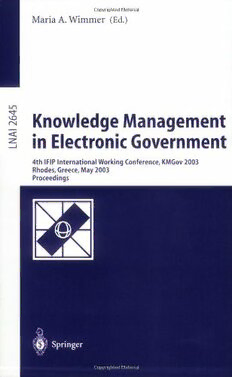
Knowledge Management in Electronic Government: 4th IFIP International Working Conference, KMGov 2003, Rhodes, Greece, May 26–28, 2003 Proceedings PDF
331 Pages·2003·6.913 MB·English
Most books are stored in the elastic cloud where traffic is expensive. For this reason, we have a limit on daily download.
Preview Knowledge Management in Electronic Government: 4th IFIP International Working Conference, KMGov 2003, Rhodes, Greece, May 26–28, 2003 Proceedings
Description:
The importance of Knowledge Management (KM) is increasingly recognized in business and public sector domains. The latter is particularly suitable for KM implementations since it deals with information and knowledge resources at a large scale: much of the work of public authorities deals with the elaboration of data, information and knowledge on citizens, businesses, society, markets, the environment, law, politics, etc. Even most products of public administration and government work are delivered in the shape of information and knowledge themselves. This especially applies to policies, management, and the regulation and monitoring of society, markets and the environment. Governments expect advanced support from KM concepts and tools to exploit these huge knowledge and information resources in an efficient way. Not only does the trend towards a knowledge society call for KM solutions, but current e government developments also significantly influence the public sector. Ample access to remote information and knowledge resources is needed in order to facilitate: Citizen and businesses oriented service delivery, including one stop service provision; interorganizational co operation between governmental agencies; cross border support for complex administrative decision making; e government integration of dislocated information and knowledge sources into a fabric of global virtual knowledge.
See more
The list of books you might like
Most books are stored in the elastic cloud where traffic is expensive. For this reason, we have a limit on daily download.
